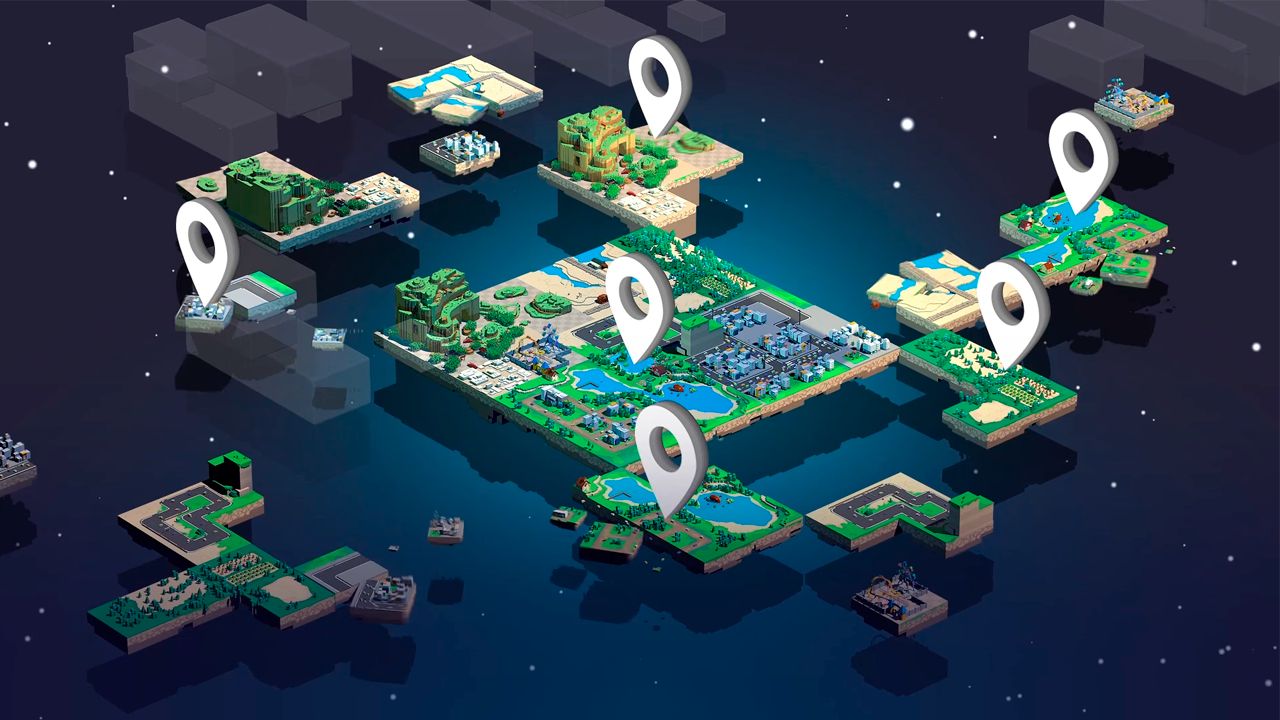Introduction
In today’s digital age, marketing strategies are constantly evolving to keep up with the latest trends and consumer behaviors. A relatively new concept that has been gaining significant attention is metaverse marketing. The metaverse is a virtual reality space where people can interact with each other and virtual objects in a collective virtual shared space. It offers a unique opportunity for businesses to engage with their audiences in innovative ways, creating immersive experiences that go beyond traditional marketing techniques.
Metaverse marketing combines elements of virtual reality, augmented reality, and social media to create a seamless and interactive user experience. Brands can create virtual environments, known as metaverses, where customers can explore, interact, and engage with their products or services. This immersive approach provides a more personal and engaging connection between brands and consumers, allowing for deeper brand loyalty and increased conversions.
The concept of the metaverse may sound futuristic, but it is already becoming a reality. Major tech companies such as Facebook and Microsoft are investing heavily in developing their metaverse platforms. Additionally, popular video games like Fortnite and Roblox are already serving as metaverse-like spaces, attracting millions of users worldwide.
The rise of metaverse marketing presents unique opportunities for businesses to connect with their target audiences in ways that were previously unimaginable. With the potential to reach a global audience, create interactive experiences, and forge deeper connections, it is clear why businesses are exploring metaverse marketing as a strategic avenue to drive growth and brand awareness.
In this article, we will delve deeper into the world of metaverse marketing. We will explore what metaverse marketing is, how it works, the benefits it offers, and provide examples of successful metaverse marketing campaigns. We will also discuss the challenges and risks associated with metaverse marketing and provide tips on how businesses can implement effective strategies to navigate this evolving landscape.
Definition of Metaverse Marketing
Metaverse marketing refers to the use of virtual reality (VR), augmented reality (AR), and social media platforms to create immersive marketing experiences within virtual environments. It involves building virtual worlds or metaverses where consumers can interact with products, services, and brands in a realistic and engaging manner.
The metaverse is a collective virtual shared space that combines elements of virtual reality, augmented reality, and social media. It is envisioned as a fully immersive digital universe where users can interact with each other and with virtual objects. Within the metaverse, brands have the opportunity to create customized virtual environments that reflect their brand image and values.
Metaverse marketing goes beyond traditional marketing techniques by offering a more interactive and personalized experience for consumers. Instead of relying solely on traditional advertisements, metaverse marketing enables brands to engage with customers in a dynamic and interactive manner. Consumers can explore virtual stores, attend virtual events, participate in gamified experiences, and even try out virtual versions of products before making a purchase.
One of the key aspects of metaverse marketing is the ability to create a sense of community and social interaction within the virtual environment. Users can connect with others, form virtual relationships, and even collaborate on projects. Brands can leverage this social aspect to foster brand loyalty and advocacy among users, creating a community of brand advocates within the metaverse.
Metaverse marketing is not limited to a particular industry or sector. It can be applied to various domains, including retail, entertainment, education, and more. From virtual fashion shows to virtual conferences and virtual product launches, metaverse marketing offers a wide range of possibilities for businesses to engage with their target audience in innovative and immersive ways.
In summary, metaverse marketing is a cutting-edge approach to marketing that leverages virtual reality, augmented reality, and social media platforms to create immersive and interactive experiences for consumers. By immersing consumers in virtual environments, brands can forge deeper connections, drive engagement, and ultimately increase brand awareness and conversions.
How Does Metaverse Marketing Work?
Metaverse marketing combines elements of virtual reality, augmented reality, and social media to create seamless and interactive experiences for consumers. It relies on the use of virtual worlds or metaverses, where brands can immerse their target audience in customized environments that reflect their brand identity and offerings.
The process of metaverse marketing starts with the creation of a virtual environment that users can access through virtual reality headsets, augmented reality devices, or even through their web browsers. Brands have the ability to design virtual stores, event spaces, or interactive experiences within these metaverses.
Once the virtual space is created, brands can leverage a variety of marketing techniques to engage with consumers. This can include creating interactive virtual experiences, such as virtual product demos or virtual fashion shows, where users can explore and interact with the brand’s offerings in a realistic and immersive manner.
Social interaction within the metaverse is also a key component of metaverse marketing. Brands can facilitate communication and collaboration among users, allowing them to connect with each other and with the brand. This social aspect adds a sense of community and authenticity, creating a more engaging and personalized experience for users.
Metaverse marketing also utilizes social media platforms to extend the reach of the virtual experiences. Brands can use social media channels to promote their virtual events, showcase highlights from the metaverse, and encourage user-generated content and sharing. This integration between the metaverse and social media helps to amplify the brand’s message and reach a wider audience.
Another important aspect of metaverse marketing is the ability to gather data and insights. Brands can track user behavior within the metaverse, such as the products or experiences they interact with, the amount of time spent in specific areas, and even their virtual interactions with other users. This data can provide valuable insights for optimizing marketing strategies and understanding consumer preferences.
Overall, metaverse marketing works by creating immersive and interactive virtual experiences that allow consumers to engage with brands and products in unique and exciting ways. By combining virtual reality, augmented reality, and social media, brands can build virtual worlds that capture the attention of their target audience, foster brand loyalty, and drive conversions.
Benefits of Metaverse Marketing
Metaverse marketing offers a multitude of benefits for businesses looking to connect with their target audience in innovative and immersive ways. Here are some of the key advantages of incorporating metaverse marketing into your overall marketing strategy:
- Enhanced User Engagement: Metaverse marketing provides a highly interactive and engaging experience for users. By immersing consumers in virtual environments, brands can captivate their attention and create memorable experiences that stand out from traditional marketing methods. This heightened level of engagement can lead to increased brand awareness, interest, and ultimately conversions.
- Personalized Brand Experiences: Metaverse marketing allows brands to customize the virtual environment to reflect their unique brand identity. From virtual stores to interactive events, businesses can create immersive experiences that align with their brand values and offerings. This personalization helps to forge deeper connections with consumers and create a more impactful brand experience.
- Global Reach: The metaverse has the potential to reach a global audience. Virtual experiences can be accessed from anywhere in the world, eliminating geographical barriers. This opens up new markets and allows businesses to connect with consumers that may have been previously out of reach. Brands can expand their reach, increase brand exposure, and tap into new customer segments.
- Community Building: Metaverse marketing facilitates social interaction and community building. Users can connect with each other, collaborate on projects, and form virtual relationships. Brands can leverage this sense of community to foster brand loyalty and advocacy. By creating a shared virtual space, businesses can encourage user-generated content, user participation, and organic word-of-mouth marketing.
- Data Insights: Metaverse marketing provides valuable data and insights that can inform marketing strategies. Brands can track user behavior within the metaverse, such as interactions with virtual products, time spent in specific areas, and social interactions. This data can help identify consumer preferences, optimize marketing campaigns, and make data-driven decisions to drive business growth.
- Innovation and Differentiation: By embracing metaverse marketing, brands showcase their innovative mindset and willingness to adapt to evolving consumer trends. Being an early adopter of this technology can help businesses stand out from competitors and position themselves as industry leaders. It demonstrates a commitment to providing cutting-edge experiences and shows a willingness to go beyond traditional marketing methods.
In summary, metaverse marketing offers numerous benefits, including enhanced user engagement, personalized brand experiences, global reach, community building, access to valuable data insights, and the ability to showcase innovation and differentiation. By leveraging the power of virtual reality, augmented reality, and social media, businesses can create immersive and interactive experiences that leave a lasting impact on their target audience.
Examples of Successful Metaverse Marketing Campaigns
Over the past few years, several brands have successfully implemented metaverse marketing campaigns, leveraging the power of virtual reality, augmented reality, and social media to engage and captivate their target audience. Here are a few noteworthy examples:
- Fortnite x Travis Scott: In April 2020, the popular game Fortnite collaborated with rapper Travis Scott to host a virtual concert within the game’s metaverse. The event attracted over 12 million concurrent players and featured a visually stunning concert experience with a virtual replica of Travis Scott performing his music. The collaboration generated significant buzz and showcased the potential for immersive entertainment experiences within the metaverse.
- Prada’s Epicenter Store: Prada, a luxury fashion brand, created a virtual replica of their flagship store known as the Prada Epicenter within the metaverse. Users could explore the virtual store, interact with virtual products, and even make purchases. The virtual store provided an innovative and immersive brand experience, allowing Prada to engage with a global audience and showcase their products in a unique way.
- Vivint Smart Home in AltspaceVR: Vivint Smart Home, a provider of home security systems, partnered with AltspaceVR to create a virtual experience that allowed users to explore and interact with the latest smart home technology. Users could virtually walk through a home and interact with different smart devices, ultimately showcasing the convenience and capabilities of Vivint’s products in an engaging and informative manner.
- Nike’s Virtual NikeLand: Nike introduced “LDNR,” a virtual representation of London in the game NBA 2K21. Within LDNR, users could explore virtual Nike stores, participate in virtual basketball games, and even purchase limited edition Nike products. The virtual environment created a unique brand experience for gamers and basketball enthusiasts, solidifying Nike’s presence in the metaverse and connecting with a new audience.
- Roblox Creator Challenges: Roblox, a popular user-generated gaming platform, partners with brands to create virtual challenges where users can complete missions and earn exclusive virtual rewards. Brands like Nike, Gucci, and Star Wars have collaborated with Roblox on these creator challenges, allowing users to engage with their products and brands within the metaverse while gamifying the experience and fostering brand loyalty.
These examples demonstrate the creative ways in which brands have successfully utilized metaverse marketing to engage with their target audience. By leveraging virtual reality, augmented reality, and social media platforms, these campaigns have provided immersive and interactive experiences, creating lasting impressions and driving brand awareness and loyalty.
Challenges and Risks of Metaverse Marketing
While metaverse marketing offers exciting opportunities for brands, it also comes with its own set of challenges and risks that businesses need to consider. Here are some of the key challenges and risks associated with metaverse marketing:
- Technical Complexity: Building and implementing metaverse marketing campaigns can be technically complex and require specialized skills. Creating virtual environments, integrating with different platforms, and ensuring a seamless user experience can be challenging. Businesses may need to invest in technical expertise or collaborate with experienced partners to overcome these complexities.
- User Adoption: Despite the growing popularity of virtual reality and augmented reality technologies, not all consumers are familiar or comfortable with the concept of the metaverse. Limited adoption of the necessary hardware, such as VR headsets, may impact the reach and effectiveness of metaverse marketing campaigns. Businesses need to consider the accessibility and availability of the required technology when targeting their audience.
- Data Privacy and Security: Metaverse marketing involves the collection and storage of user data within virtual environments. Ensuring data privacy and security is crucial to maintain consumer trust. Businesses need to implement robust security measures and comply with relevant data protection laws to safeguard user data from breaches or unauthorized access.
- Platform Dependence: Metaverse marketing often relies on specific platforms or technology providers. This dependence on third-party platforms may limit flexibility and control for brands. Changes in platform policies or the discontinuation of certain platforms could impact the long-term viability of metaverse marketing campaigns. Businesses should consider diversifying their presence across multiple platforms to mitigate platform dependence risks.
- Content Creation: Creating compelling and interactive content for the metaverse requires additional resources and expertise compared to traditional marketing methods. Brands need to invest in the development of high-quality virtual experiences, including 3D modeling, animation, and scripting. This may involve collaboration with creative agencies or in-house talent with experience in virtual content creation.
- User Experience: Ensuring a positive and intuitive user experience within the metaverse is essential for the success of marketing campaigns. The virtual environment should be user-friendly, responsive, and optimized for different devices. Poor user experience or technical glitches can negatively impact user engagement and perception of the brand. Thorough testing and continuous improvements are necessary to deliver a seamless user experience.
It is crucial for businesses embarking on metaverse marketing to be aware of these challenges and risks. By addressing these concerns strategically and adequately planning for them, brands can mitigate potential risks and maximize the potential benefits of metaverse marketing initiatives.
Tips for Implementing Metaverse Marketing Strategies
Implementing successful metaverse marketing strategies requires careful planning and execution. Here are some key tips to consider when incorporating metaverse marketing into your overall marketing strategy:
- Set Clear Objectives: Define your goals and objectives for the metaverse marketing campaign. Whether it’s increasing brand awareness, driving sales, or fostering brand loyalty, having clear objectives will guide your strategy and help measure the success of your efforts.
- Research and Understand Your Audience: Understand your target audience’s interests, preferences, and behaviors within the metaverse. Conduct market research and gather insights to tailor your experiences and offerings specifically to meet the needs and expectations of your audience.
- Choose the Right Platform: Select the metaverse platform that aligns with your target audience and campaign objectives. Consider factors such as user base, accessibility, and available features. Depending on your target audience, platforms like Roblox, Minecraft, or virtual reality platforms like Oculus may be suitable options.
- Create Immersive and Engaging Experiences: Focus on creating immersive experiences that captivate and engage your audience. Utilize interactive elements, storytelling, gamification, and social integration to enhance the overall experience and encourage participation.
- Collaborate with Influencers: Partner with influencers or content creators who have a presence within the metaverse to amplify your brand and reach a wider audience. Influencers can help showcase and promote your experiences, products, or services to their dedicated followers, boosting your visibility and credibility.
- Ensure Cross-Platform Integration: Integrate your metaverse marketing efforts with other marketing channels and platforms. This includes promoting virtual experiences through social media, incorporating metaverse elements into your website, and leveraging email marketing to drive engagement and conversions. A seamless integration across platforms will expand your reach and maximize the impact of your campaigns.
- Monitor and Analyze Performance: Track and analyze key metrics to measure the success of your metaverse marketing campaigns. Monitor user engagement, conversion rates, social media sentiment, and other relevant data points to gain insights and make data-driven decisions for continuous improvement.
- Stay Updated with Emerging Technologies: The metaverse landscape is rapidly evolving, and new technologies and platforms will continue to emerge. Stay informed about the latest advancements in virtual reality, augmented reality, and social media to adapt and stay ahead of the curve in your metaverse marketing strategies.
By following these tips, brands can effectively implement metaverse marketing strategies and leverage the immersive nature of the metaverse to connect with their audience, drive engagement, and achieve their marketing objectives.
Conclusion
Metaverse marketing presents a transformative opportunity for businesses to connect with their target audience in immersive and interactive ways. By leveraging virtual reality, augmented reality, and social media platforms, brands can create virtual environments that capture the attention and engage the senses of their consumers.
The metaverse offers a host of benefits for marketers, including enhanced user engagement, personalized brand experiences, global reach, community building, access to valuable data insights, and the ability to showcase innovation and differentiation. These advantages have led to the successful implementation of metaverse marketing campaigns by notable brands across various industries.
However, it is important to acknowledge the challenges and risks associated with metaverse marketing. Technical complexity, user adoption, data privacy and security, platform dependence, content creation, and ensuring a seamless user experience are factors that businesses need to carefully consider and address in their metaverse marketing strategies.
To implement successful metaverse marketing strategies, brands should set clear objectives, conduct thorough research on their target audience, choose the right platform, create immersive experiences, collaborate with influencers, integrate with other marketing channels, monitor performance, and stay updated with emerging technologies.
As the metaverse continues to evolve and gain popularity, it is essential for businesses to embrace this innovative marketing approach to stay ahead and deliver memorable experiences to their audience. By leveraging the power of the metaverse, brands can forge deeper connections, foster brand loyalty, and drive business growth in the increasingly digital and immersive world.

























